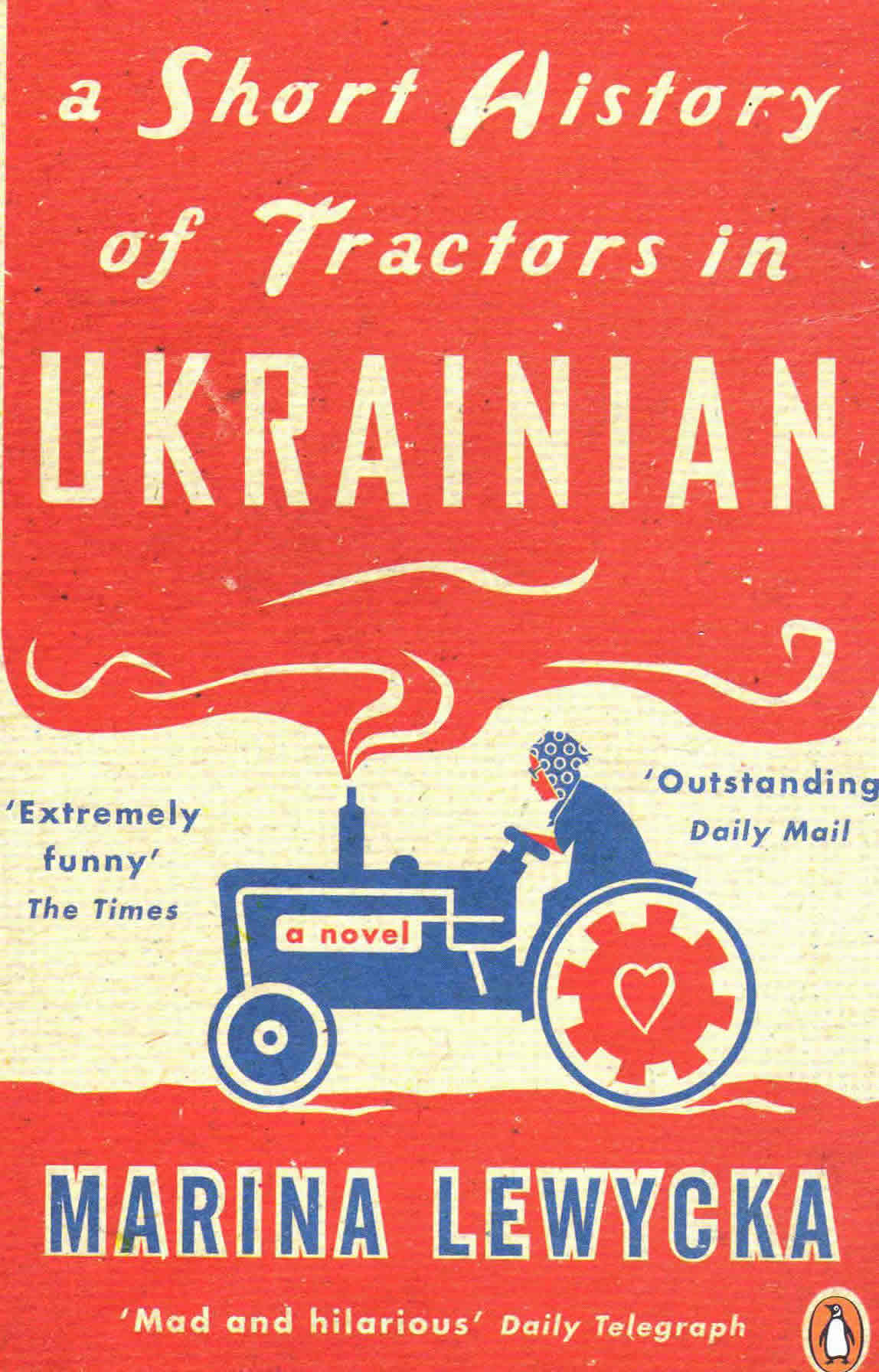A Short History of Tractors in Ukrainian, by Marina Lewycka
Sep 17
2006

The original cover of Marina Lewycka’s novel A Short History of Tractors in Ukrainian was extremely tasteful. The background is a lovely grayish blue, and there’s a yellow border running down the edge, decorated with a pattern suggestive of Slavic pottery. There’s a cluster of apples in the center, next to a dark gold circle identifying the book as a Booker Prize nominee. Normally, so much unrelieved good taste makes me nervous, but I found the excerpt printed across the bottom of the page to be very encouraging:
That bit got my hopes up. I have several elderly, temperamental, Eastern European relatives myself, and I was eager see just how universal my family’s experiences were.
To my initial disappointment, the elegant cover turned out to be quite appropriate. Lewycka’s story is no rollercoaster of hilarity (although it did win a Wodehouse prize, so maybe I just missed something). It has some very amusing moments—the author has a gift for cuttingly funny descriptions—but this is primarily a story about the way we define ourselves by our families’ pasts, and how caring for our elders helps us to grow up ourselves.
Lewycka’s narrator is Nadia, a middle-aged sociologist of Ukrainian descent with an estranged older sister and an eccentric widower father. When her father announces his plan to marry a much, much younger woman from the old country, he tries to present his marriage as an act of pure altruism (“If I can save just one human being...”), but his daughter is skeptical about his motives. (Particularly after hearing his description of his bride-to-be: “Botticelli’s Venus rising from waves. Golden hair. Charming eyes. Superior breasts.”) Nadia is even more upset when she meets her new stepmother—Valentina is a voluptuous, bleached-blonde vixen, decked out in miniskirts and high-heeled peep-toe mules, full of noisy demands that her fiancée buy her a Mercedes with his pension money. Horrified by this unexpected threat, Nadia and her sister, Vera, set aside their past quarrels and reunite in an effort to save their disreputable father from himself.
A Short History of Tractors in Ukrainian grows on you. By the end of the book, I was surprised by how emotionally invested I was in the characters’ welfare—even that of the unscrupulous Valentina. But my favorite part of Lewycka’s book was the sisters’ reconciliation. Their newfound mutual understanding will remind readers that dealing with exasperating elderly relatives has one surprising benefit: it encourages family members to set aside their differences and bond over the shared difficulties of caring for a geriatric hell-raiser. And while that might not be the most warm and fuzzy inspirational message ever (Tuesdays With Morrie this isn't), it’s a silver lining that isn't to be sneezed at.
“Two years after my mother died, my father fell in love with a glamorous blond Ukrainian divorcée. He was eighty-four and she was thirty-six. She exploded into our lives like a fluffy pink grenade...”
That bit got my hopes up. I have several elderly, temperamental, Eastern European relatives myself, and I was eager see just how universal my family’s experiences were.
To my initial disappointment, the elegant cover turned out to be quite appropriate. Lewycka’s story is no rollercoaster of hilarity (although it did win a Wodehouse prize, so maybe I just missed something). It has some very amusing moments—the author has a gift for cuttingly funny descriptions—but this is primarily a story about the way we define ourselves by our families’ pasts, and how caring for our elders helps us to grow up ourselves.
Lewycka’s narrator is Nadia, a middle-aged sociologist of Ukrainian descent with an estranged older sister and an eccentric widower father. When her father announces his plan to marry a much, much younger woman from the old country, he tries to present his marriage as an act of pure altruism (“If I can save just one human being...”), but his daughter is skeptical about his motives. (Particularly after hearing his description of his bride-to-be: “Botticelli’s Venus rising from waves. Golden hair. Charming eyes. Superior breasts.”) Nadia is even more upset when she meets her new stepmother—Valentina is a voluptuous, bleached-blonde vixen, decked out in miniskirts and high-heeled peep-toe mules, full of noisy demands that her fiancée buy her a Mercedes with his pension money. Horrified by this unexpected threat, Nadia and her sister, Vera, set aside their past quarrels and reunite in an effort to save their disreputable father from himself.
A Short History of Tractors in Ukrainian grows on you. By the end of the book, I was surprised by how emotionally invested I was in the characters’ welfare—even that of the unscrupulous Valentina. But my favorite part of Lewycka’s book was the sisters’ reconciliation. Their newfound mutual understanding will remind readers that dealing with exasperating elderly relatives has one surprising benefit: it encourages family members to set aside their differences and bond over the shared difficulties of caring for a geriatric hell-raiser. And while that might not be the most warm and fuzzy inspirational message ever (Tuesdays With Morrie this isn't), it’s a silver lining that isn't to be sneezed at.
Posted by: Julia, Last edit by: Julianka
No new comments are allowed on this post.
Comments
No comments yet. Be the first!